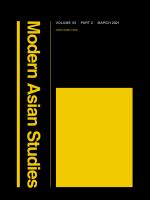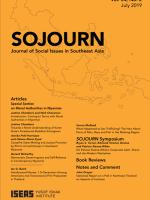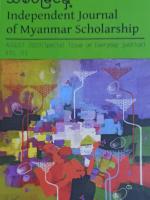Frontier Governance
This article written by DIIS senior researcher, Helene Maria Kyed, explores governance and access to justice in an ethnic minority village in Karen state of Myanmar, where the ethnic armed organisation, the Karen National Union (KNU) exerts control and enjoys local legitimacy.
It draws on intensive fieldwork in the period 2016 to 2018, during which Myanmar was under the national leadership of the democratically elected Aung San Suu Kyi and her party, the National League for Democracy (NLD). At that time, the KNU, which fought the military for seven decades in pursuit of self-determination, had signed a national ceasefire agreement, which ended the armed fighting in most Karen areas and allowed for the consolidation of more civilian forms of governance. An actual peace agreement, which would establish who should govern which areas and how, was still not in place, however, leaving many villagers uncertain of the future. Since the article was written, the military in Myanmar has again taken power over the country through what legally speaking is a coup d’état. It has also begun to wage new attacks on Karen villages. This happened shortly after Aung San Suu Kyi and the NLD won another landslide election.
Employing a perspective from the ‘border’ or ‘frontier’ of state governance, the article gives important insights into the fragile conditions of peace and plural authorities that existed before the coup, despite the gains that had been made in the years with partial civilian governance. It shows how the Myanmar central state, despite its efforts to expand its civilian governance structures into the Karen villages, continued to be mistrusted and associated with decades of oppressive military rule. Instead, the KNU had since the ceasefire operated as a parallel nation-state in the making, e.g., by setting up village level justice and administrative systems and by providing alternative education. These systems were widely used and trusted by ordinary Karen villages, and even by Karen people who live within the Myanmar state-controlled town.
The KNU also engaged in the policing of narcotics and the punishment of non-Karen drug traffickers to protect the villagers they claim to represent. This created a situation of both contested and pluralised authorities, including the KNU, the central Myanmar state institutions and the armed actors. For these reasons ordinary villages were still very wary of believing in peace and secure governance. The continued presence of Myanmar army bases in and around the Karen villages also remained a constant reminder of the fragile situation.
The article draws on research conducted by the DIIS-coordinated research project, ‘Everyday Justice and Security in the Myanmar Transition’ (EverJust), which is done in partnership with Yangon University, the Enlightened Myanmar Research Foundation, and Aarhus University. It is funded by the Danish Ministry of Foreign Affairs through the development research grant.
DIIS Experts





